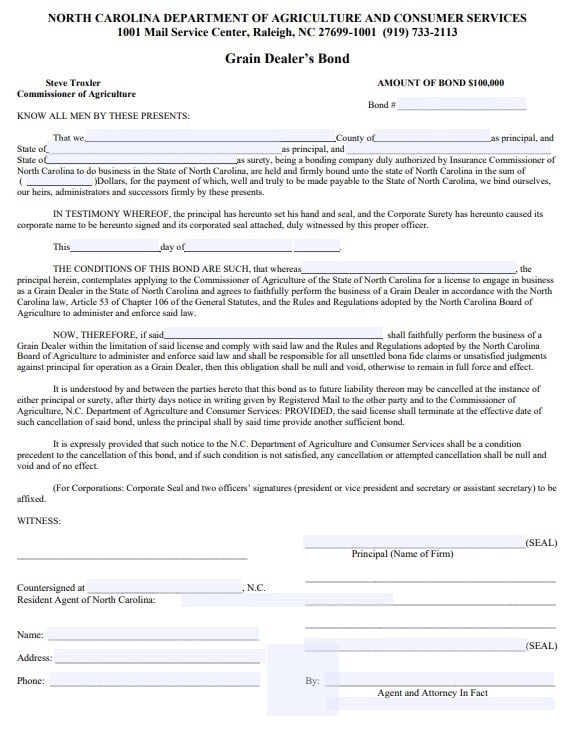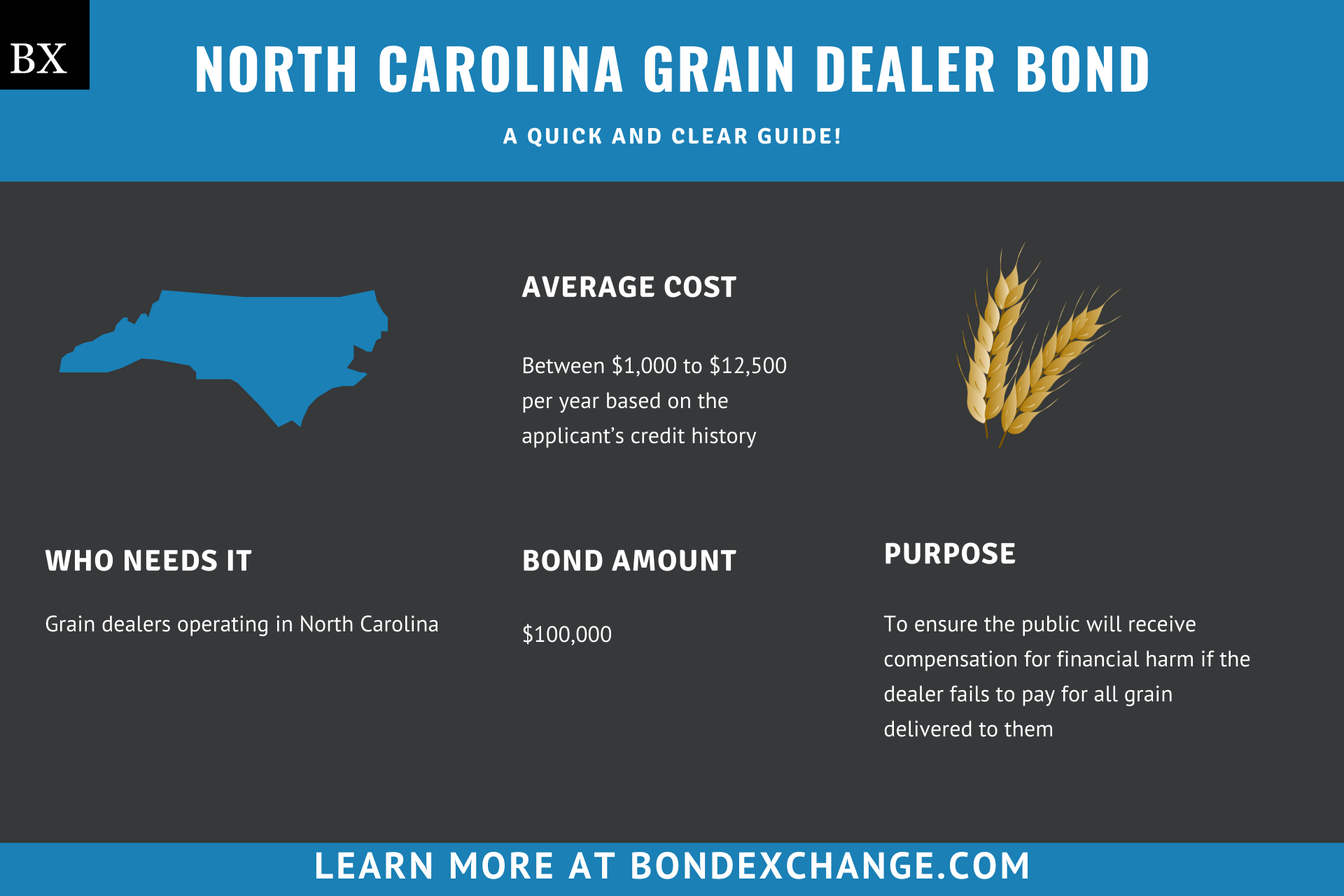North Carolina Grain Dealer Bond: A Comprehensive Guide
This guide provides information for insurance agents to help their customers obtain a North Carolina Grain Dealer bond
At a Glance:
- Lowest Cost: $1,000 per year or $100 per month, based on the applicant’s credit history
- Bond Amount: $100,000
- Who Needs it: Grain dealers operating in North Carolina (dealers who buy with cash only are exempt from the bonding requirement)
- Purpose: To ensure the public will receive compensation for financial harm if the dealer fails to pay for all grain delivered to them
- Who Regulates Grain Dealers in North Carolina: The North Carolina Department of Agriculture and Consumer Services (NCDA&CS)

Background
North Carolina Statute 106-602 requires all grain dealers operating in the state to obtain a license with the NC DA&CS. The North Carolina legislature enacted the licensing requirement to ensure that grain dealers engage in ethical business practices. To provide financial security for the enforcement of the licensing law, dealers that do not buy grain solely with cash must purchase and maintain a $100,000 surety bond to be eligible for licensure.
What is the Purpose of the North Carolina Grain Dealer Bond?
North Carolina requires dealers that do not buy grain exclusively with cash to purchase a surety bond as part of the application process to obtain a business license. The bond ensures that the public will receive compensation for financial harm if the dealer fails to abide by the regulations outlined in North Carolina Statutes 106-601 et seq. Specifically, the bond protects the public if the dealer engages in any acts of fraud or fails to pay producers for any grain that has been delivered. In short, the bond is a type of insurance that protects the public if the dealer violates the terms of their license.
How Can an Insurance Agent Obtain a North Carolina Grain Dealer Surety Bond?
BondExchange makes obtaining a North Carolina Grain Dealer Bond easy. Simply login to your account and use our keyword search to find the “Grain Dealer” bond in our database. Don’t have a login? Gain access now and let us help you satisfy your customers’ needs. Our friendly underwriting staff is available by phone (800) 438-1162, email or chat from 7:30 AM to 7:00 PM EST to assist you.
At BondExchange, our 40 years of experience, leading technology, and access to markets ensures that we have the knowledge and resources to provide your clients with fast and friendly service whether obtaining quotes or issuing bonds.
Not an agent? Then let us pair you with one!
Click the above image to find a BX Agent near you
Is a Credit Check Required for the North Carolina Grain Dealer Bond?
Surety companies will run a credit check on the dealer to determine eligibility and pricing for the North Carolina Grain Dealer bond. Dealers with excellent credit and work experience can expect to receive the best rates. Dealers with poor credit may be declined by some surety companies or pay higher rates. The credit check is a “soft hit”, meaning that the credit check will not affect the dealer’s credit.
How Much Does the North Carolina Grain Dealer Bond Cost?
The North Carolina Grain Dealer Bond can cost anywhere between $1,000 to $12,500 per year or $100 to $1,250 per month. Insurance companies determine the rate based on several factors including your customer’s credit score and experience. The chart below offers a quick reference for the cost of a $100,000 bond requirement.
$100,000 Grain Dealer Bond Cost
| Credit Score | Bond Cost (1 year) | Bond Cost (1 month) |
|---|---|---|
| 720+ | $1,000 | $100 |
| 680 – 719 | $1,500 | $150 |
| 65o – 679 | $2,000 | $200 |
| 600 – 649 | $4,000 | $400 |
| 550 – 599 | $7,500 | $750 |
| 500 – 549 | $12,500 | $1,250 |
Who is Required to Purchase the Bond?
North Carolina requires grain dealers that do not buy grain exclusively with cash to purchase a surety bond as a prerequisite to obtaining a business license. To paraphrase North Carolina Statute 106-601, a grain dealer is a person that buys, sells, transfers, or stores the grain of a North Carolina producer and who owns or operates a facility and/or vehicle for these purposes.
Producers buying grain for consumption on their own farms are exempt from this definition.
BondExchange now offers monthly pay-as-you-go subscriptions for surety bonds. Your customers are able to purchase their bonds on a monthly basis and cancel them anytime. Learn more here.
How Do North Carolina Grain Dealers Apply for a License?
Grain dealers in North Carolina must navigate several steps to obtain a license. Below are the general guidelines, but dealers should refer to the NCDA&CS’s licensing page for details on the process.
License Period – All North Carolina Grain Dealer Licenses expire on June 30 of each year and must be renewed before the expiration date
Step 1 – Purchase a Surety Bond
Grain dealers that do not buy grain exclusively with cash must purchase and maintain a $100,000 surety bond.
Step 2 – Complete the Application
All North Carolina Grain Dealer License applications should be mailed to the following address:
Plant Industry Division
1085 Mail Service Center
Raleigh, NC 27699-1085
Dealers must complete the application in its entirety and pay the following fees:
-
- $50 licensing fee
- $30 fee per truck
- $30 fee per buying station
Dealers that buy grain solely with cash must submit a completed surety bond exemption form with their application. Additionally, dealers that qualify for an exemption from inspection fees must submit a completed exempt permit application with their license application.
How do North Carolina Grain Dealers Renew Their Licenses?
Before the expiration date, the NCDA&CS will send dealers a renewal notice containing instructions on how to renew their licenses. Grain dealers should mail their completed renewal applications, including all required fees, to the following address:
Plant Industry Division
1085 Mail Service Center
Raleigh, NC 27699-1085
All North Carolina Grain Dealer Licenses expire on June 30 of each year and must be renewed before the expiration date.
What are the Insurance Requirements for the North Carolina Grain Dealer License?
North Carolina does not require grain dealers to obtain any form of liability insurance as a prerequisite to obtaining a business license. Dealers that do not buy grain exclusively with cash must purchase and maintain a $100,000 surety bond.
How Do North Carolina Grain Dealers File Their Bonds?
Grain dealers should submit their completed bond forms, including the power of attorney, to the following address:
Plant Industry Division
1085 Mail Service Center
Raleigh, NC 27699-1085
The surety bond requires signatures from the surety company that issues the bond as well as the dealer and their witness. The surety company should include the following information on the bond form:
- Legal name, county, and state of the entity/individual(s) buying the bond
- Surety company’s name and state of incorporation
- Bond amount
- Date the bond is signed
What Can North Carolina Grain Dealers Do to Avoid Claims Against Their Bonds?
To avoid claims on their bonds, grain dealers in North Carolina must ensure that they follow all license regulations in the state, including some of the most important issues below that tend to cause claims:
- Do not engage in any acts of fraud
- Pay all producers on time and in full
What Other Insurance Products Can Agents Offer Grain Dealers in North Carolina?
North Carolina does not require grain dealers to purchase liability insurance as a prerequisite to obtaining a business license. However, most reputable dealers will purchase liability insurance anyway. Bonds are our only business at BondExchange, so we do not issue any other types of insurance, but our agents often utilize brokers for this specific line of business. A list of brokers in this space can be found here.
How Can Insurance Agents Prospect for North Carolina Grain Dealer Customers?
North Carolina conveniently provides a public database of active grain dealers in the state. Contact BondExchange for additional marketing resources. Agents can also leverage our print-mail relationships for discounted mailing services.


